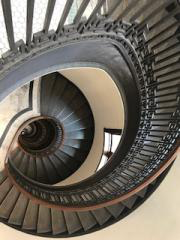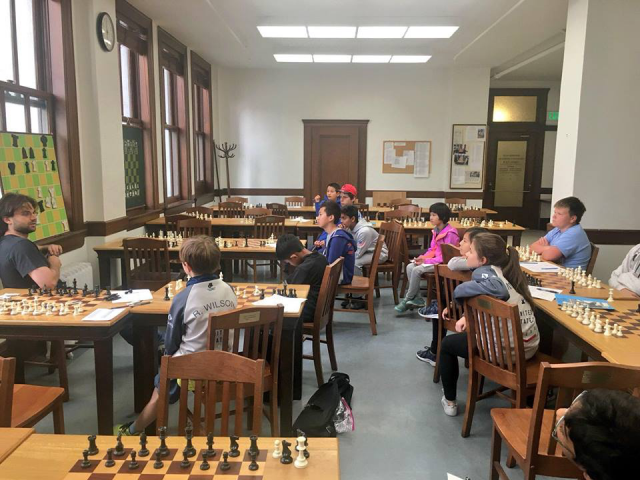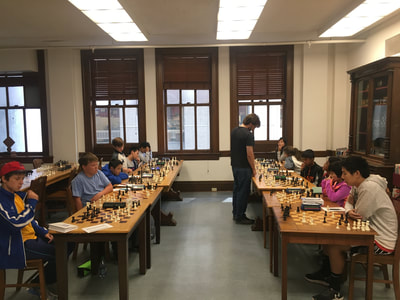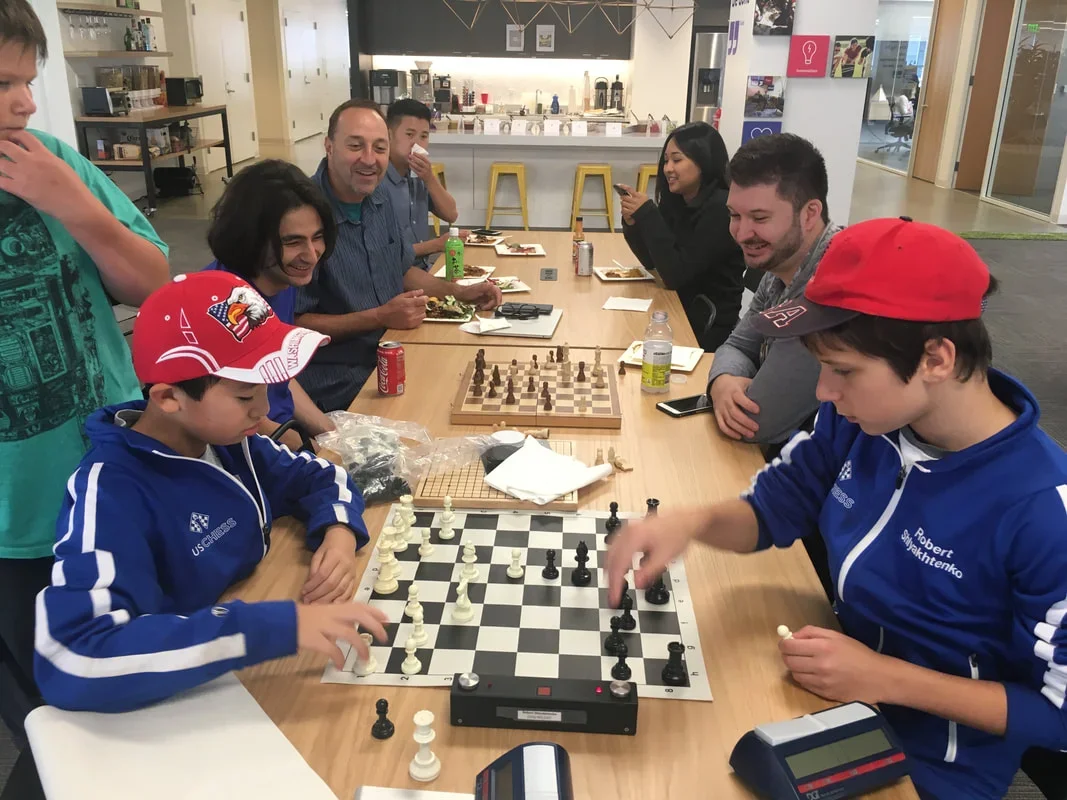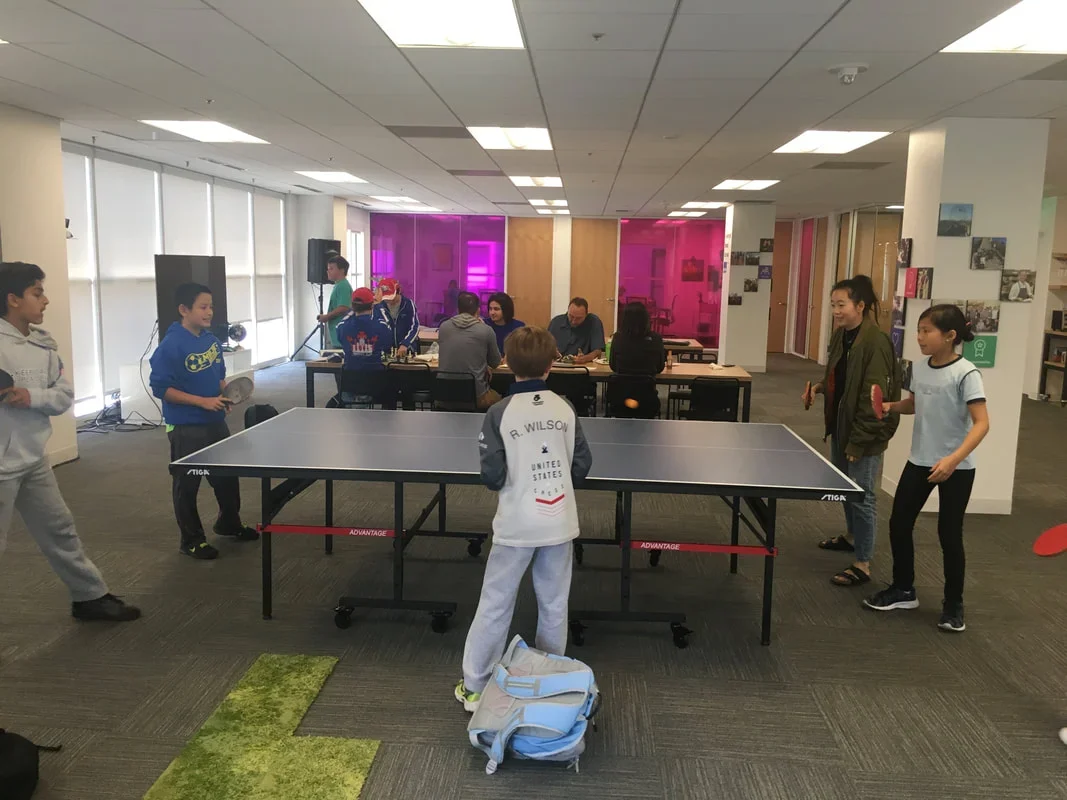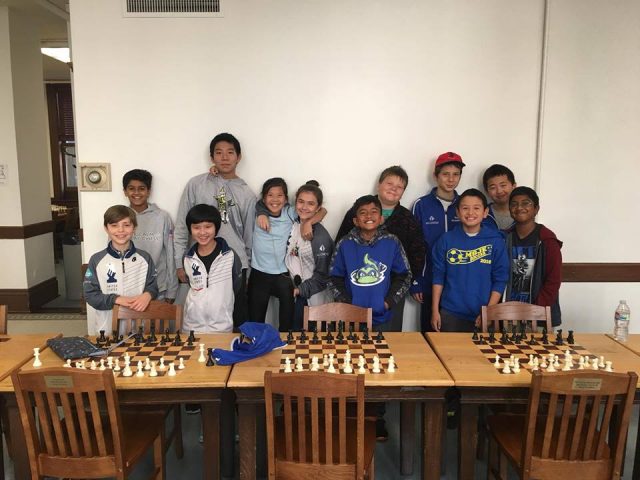 Back row: (left to right): Vyom Vidyarthi, Derek Wu, Rochelle Wu, Nastassja Matus, Adrian Kondakov, Robert Shlyakhtenko (for some reason I’m smiling), Eric Li; Front row: Ronen Wilson, Rui Yang Yan, Shawnak Shivakumar, Kevin Pan, Sriram Krishnakumar.
Back row: (left to right): Vyom Vidyarthi, Derek Wu, Rochelle Wu, Nastassja Matus, Adrian Kondakov, Robert Shlyakhtenko (for some reason I’m smiling), Eric Li; Front row: Ronen Wilson, Rui Yang Yan, Shawnak Shivakumar, Kevin Pan, Sriram Krishnakumar.I was honored to be a participant in the 46th US Chess School. Held in San Francisco from August 7-10, this was an invitational 12-player camp with ratings ranging from 1950 through 2300, and was organized by IM Greg Shahade. The camp itself was located at the historic Mechanics Institute, which was founded 154 years ago. Rumor has it that my hotel was last painted at around that time.
This year’s camp had an additional surprise: It was taught by the reigning U.S. Champion, GM Sam Shankland. For those who have spent the last few months under a rock, Sam recently won three super-tournaments in a row, went more than 60 games undefeated, entered the Top 30 in the world, and raised his rating to an all-time high of 2727 FIDE. He's now in Batumi to defend the United States gold medal performance. What follows from here is a day-to day account of the camp. Day 1: Almost every day started the same way. Sam would give us about 45 minutes to find the best continuation in six positions. Most of the time the positions were complicated middlegames where one would have to calculate some forced variation, but there were always a couple of endgame positions as well. The test was extremely difficult; Sam shared with us that even he incorrectly solved one position. I didn’t do so well on the first day and scored 2.5/6.
After that Sam set up an endgame position for us to discuss in groups. When we believed we had found the right idea (either to draw with white or to win with black), we had to choose a color and play against him. My game was rather eventful. Playing as the pawn-up side, I found the right moves up to a point but got very low on time (it was a 3 minute game). I made a few terrible moves and the game slipped into a draw, at which point I blundered and let his pawn reach the promotion square (yes, I lost. Don’t laugh). Sam Shankland’s Greatest Quotes, #1:
You know, I’m very impressed. I don’t think I’ve ever heard so much nonsense in ten seconds” -- upon hearing me discuss the endgame position with someone.
After lunch we played a clock simul against Sam. He only acquiesced two draws, to Shawnak Shivakumar and your author. Shawnak’s game was even much better at some point. My game was far more modest:
[pgn] [Event "US Chess School simul"] [Site "?"] [Date "2018.08.07"] [Round "?"] [White "Shankland, Sam"] [Black "Shlyakhtenko, Robert"] [Result "1/2-1/2"] [ECO "A20"] [WhiteElo "2727"] [BlackElo "2300"] [Annotator "Shlyakhtenko,Robert"] [PlyCount "121"] 1. c4 e5 2. g3 h5 {This rare line has seen a surge in popularity recently.} 3. Nf3 (3. h4 {is the main move, after which play usually continues along the lines of} Nc6 4. Bg2 Bc5 5. Nc3 d6 6. d3 Nge7 7. Nf3 a6 8. a3 Bg4 9. b4 Ba7 10. Bb2 Qd7 11. Rc1 O-O 12. O-O f5 {with the inclusion of the moves h5 and h4, the idea f5-f4 comes with much greater force.} 13. Kh2 f4 14. Qd2 Nf5 15. Nd5 $2 { white's position was already bad, but this just makes things worse.} Bxf2 $1 { and black soon won:} 16. gxf4 Bg3+ 17. Kg1 exf4 18. Nxf4 Ne3 19. Qxe3 Bxf4 20. Qe4 Bxc1 21. Rxc1 Rae8 22. Qd5+ Kh8 23. b5 Rxe2 24. bxc6 bxc6 25. Qd4 Bxf3 26. Bh3 Qe7 {0-1 (26) D'Costa,L (2420)-Edouard,R (2635) London 2015}) ({There are several other reasonable alternatives, for example:} 3. Nc3) (3. Bg2) (3. h3) ( 3. d4) ({or} 3. d3) 3... e4 4. Nh4 Be7 5. Nf5 Bf6 $6 {I forgot my analysis and played a weak move.} (5... d6 {is the usual move; after} 6. Nxe7 ({Of course not} 6. Nxg7+ $2 Kf8) 6... Qxe7 7. Nc3 Nf6 8. d3 {and white can hope for a small advantage thanks to his bishop pair.}) 6. d3 ({Another idea was} 6. Ne3 { and if, for example} Nc6 ({No better is} 6... Bd4 {to open the f6 square for the knight.} 7. Nc3 Nf6 8. Qc2 Bxc3 9. Qxc3 $16) ({or} 6... h4 7. Bg2 d6 8. Bxe4 Nc6 {with doubtful compensation for the pawn.}) 7. Bg2 {black has trouble defending e4.}) 6... exd3 7. Qxd3 Nc6 8. Bg2 Nge7 9. Nxe7 Qxe7 {Other captures were possible, but developing a piece is the most natural. But unfortunately this runs straight into Nc3-Nd5.} ({For that reason, maybe} 9... Bxe7 {was the most prudent.}) 10. Nc3 h4 11. Nd5 Nb4 $1 12. Nxf6+ (12. Nxc7+ $2 Kd8 13. Qb3 Kxc7 14. Bf4+ Kd8) 12... Qxf6 13. Qd2 ({I was expecting} 13. Qe4+ Qe7 $14) 13... Nc6 14. Qf4 (14. O-O hxg3 15. hxg3 (15. fxg3 Qd4+ 16. Qxd4 Nxd4 $11) 15... d6 {and things can easily get dangerous for white on the h-file, though he is still playing for an edge.}) 14... Qxf4 15. Bxf4 d6 16. O-O-O {White holds a slight advantage in this ending because of his bishop pair.} (16. c5 $5 dxc5 17. Bxc7 (17. Rc1 Be6 18. Rxc5 Bxa2 19. Bxc7 $14) 17... Be6 18. Bxc6+ bxc6 19. Kd2 {Black should hold here, since even if black loses one of the c-pawns the presence of opposite colored bishops and the limited material will easen the defensive task.}) 16... Be6 17. b3 a5 {Preparing a4, weakening the b3 pawn, while also activating the rook on the a-file.} 18. Kb2 a4 19. Bd2 Kd7 20. Bc3 f6 21. c5 $6 {Under the hectic conditions of a simul, Sam probably underestimated black's 22nd.} ({It's difficult to suggest an active plan for white. Pushing the kingside pawn majority would seem natural but black always has counterplay, e.g.} 21. f4 Rae8 22. e4 Bg4 23. Rde1 h3 24. Bf1 Bf3) 21... axb3 22. axb3 Rh5 $1 {I was happy to have seen this advance. The combination of the moves a5-a4 and h5-h4 allows black to activate his rook in an unusual manner.} (22... Na5 $5 23. cxd6 c6 24. Bxa5 Rxa5 {was another idea.}) 23. cxd6 Rb5 (23... cxd6 {was also possible, for example} 24. Be4 Rb5 25. Bc2 Ne5 $11) 24. dxc7+ Kxc7 25. Ra1 Rxb3+ 26. Kc2 Nb4+ 27. Bxb4 Rxa1 28. Rxa1 Rxb4 $11 29. Ra8 Bc8 30. Ra3 hxg3 31. hxg3 Bf5+ 32. Kc3 Rb1 33. Kd4 Rb2 34. Bf3 Be6 35. Ra8 Rb4+ 36. Kc3 Rb3+ 37. Kc2 Rb5 38. Rh8 Ra5 39. Re8 Bf5+ 40. Kc3 Re5 41. Rf8 Re7 42. Kd4 Rd7+ 43. Kc5 Re7 44. e3 Re5+ 45. Kd4 Re7 46. Bd5 Bd7 47. e4 {Black hasn't defended in the most accurate way possible, but it's still not enough for white to win.} Bc6 48. f4 Rd7 49. g4 Kd6 50. Re8 Bxd5 51. exd5 Re7 52. Rd8+ Rd7 53. Rg8 Re7 54. g5 fxg5 55. fxg5 Rf7 56. g6 Rf4+ 57. Ke3 Rg4 58. Rxg7 Kxd5 59. Kf3 Rg1 60. Kf4 Ke6 61. Rxb7 1/2-1/2[/pgn]
Also deserving mention was Derek Wu, who achieved a close-to-winning position but decided to “do a Robert” and lose it: thinking that he would queen one of his pawns, he sacrificed a rook only to realize that the pawn could be stopped. https://twitter.com/USChessSchool/status/1026978246640848896 Day 2 On this day we found at that my hotel’s food was older than the paint on the walls, and about as tasty. Sam gave us six positions to solve again, except with a little bit more time. One puzzle was especially tough: Once you see the move, it looks incredibly simple, but there are so many tempting continuations that no one in the camp found the move:
[pgn] [Event "Obro Open, Copenhagen"] [Site "?"] [Date "2017.??.??"] [Round "?"] [White "Vesterli, Michael"] [Black "Le Besq, Alexander"] [Result "1/2-1/2"] [ECO "E99"] [Annotator "Shlyakhtenko,Robert"] [SetUp "1"] [FEN "r1b3k1/p4r2/PpNp4/1N1Pp3/4Pn2/4bPqp/1PQ3P1/R2K1B1R w - - 0 37"] [PlyCount "6"] 37. Nxd6 Rh7 $3 {Very simple, once you see it! Black threatens hxg2 and there is simply nothing white can do about it.} (37... hxg2 $2 { was played in the game.} 38. Bxg2 Nxg2 39. Nxf7 Kxf7 (39... Qxf3+ 40. Qe2 Bg4 41. Rh8+ Kg7 42. Qxf3 Bxf3+ 43. Kc2 Bxe4+ 44. Kc3 Rxh8 45. Nxh8 Nf4 46. Nxa7 Nxd5+ $13) 40. Nxe5+ (40. Qd3 $1 {and the king runs to the queenside via c2.} Qxf3+ 41. Kc2 Qf2+ 42. Kb3 $18) 40... Qxe5 41. Qxg2 Bh3 42. Qxh3 (42. Qe2 Qd4+ 43. Kc2 Rc8+ 44. Kb1 {was the only way to play for a win.}) 42... Qd4+ 43. Kc2 Qc4+ 44. Kb1 Qd3+ 45. Ka2 Qxa6+ 46. Kb1 Qd3+ {and a draw was agreed.}) (37... Nxg2 $2 {was also suggested, but after} 38. Qc3 $1 {things are far from clear.} ) (37... Bg4 $2 38. Nxe5 Nxg2 39. Qc3 Rxf3 40. Nxf3 {and once again, it's a complete mess.}) 38. Ne7+ Rxe7 39. Nxc8 Rg7 $19 1/2-1/2 [/pgn]
We had an endgame challenge again, which I believe everyone failed, though a few people were very close.
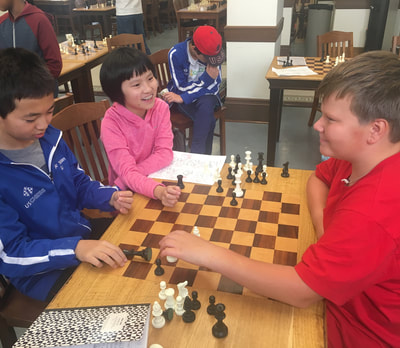 Eric Li, Rui Yang Yan, and Adrian Kondakov attempt the endgame challenge while I pretend to concentrate in the background.
Eric Li, Rui Yang Yan, and Adrian Kondakov attempt the endgame challenge while I pretend to concentrate in the background.In the afternoon Greg took us to a chocolate store nearby; Everyone got free samples and Greg bought a box of chocolates for the winner of the blitz tournament. As any of the cashiers would tell you, there is nothing more frightening than having twelve kids walk into your store all at once; when leaving, I heard one of them sigh: “Oh my Lord...” Once we got back to the camp, Sam showed us a series of positions entitled “Beat Sam”, in which his opponents were either winning or at least had a serious advantage, but missed the correct continuation and failed to convert. My favorite was the following one:
[pgn] [Event "Danzhou 9th"] [Site "Danzhou"] [Date "2018.07.27"] [White "Bu, Xiangzhi"] [Black "Shankland, Samuel L"] [Result "1/2-1/2"] [ECO "D73"] [WhiteElo "2712"] [BlackElo "2727"] [Annotator "Shlyakhtenko,Robert"] [PlyCount "51"] [EventDate "2018.07.27"] [EventType "tourn"] [EventRounds "7"] [EventCountry "CHN"] [EventCategory "20"] [SourceTitle "CB32_2018"] [SourceDate "2018.08.08"] [SourceVersion "1"] [SourceVersionDate "2018.08.08"] [SourceQuality "1"] 1. Nf3 d5 2. g3 g6 3. Bg2 Bg7 4. d4 Nf6 5. c4 dxc4 6. Qa4+ Nfd7 7. Nbd2 O-O 8. Nxc4 c5 9. dxc5 Nxc5 10. Qa3 Nba6 11. Bf4 Be6 12. Rc1 b5 13. Nce5 Rc8 14. O-O b4 15. Qe3 Bxa2 16. Ra1 Bd5 17. Rfd1 e6 18. Bh6 Qf6 19. Ng4 Qxb2 20. Nfe5 f5 21. Bxg7 Kxg7 22. Bxd5 exd5 {Diagram [#]} 23. Nd3 $1 (23. Rxa6 $2 {was played in the game. After} Nxa6 24. Nd3 Qc3 25. Rc1 Qxc1+ 26. Nxc1 fxg4 {Black eventually held a draw.} 27. Nd3 h5 28. Qxa7+ Nc7 29. Nf4 Kh7 30. Qb7 b3 31. Qxb3 Rxf4 32. gxf4 Ne6 33. e3 Rc5 34. Qb6 Rc1+ 35. Kg2 Ng7 36. Qb7 d4 37. e4 Rc3 $1 {so that on f5 there is Rf3.} 38. e5 d3 39. Qd7 Rc4 40. Qxd3 Rxf4 41. Qd5 Rf8 42. Qd7 Re8 43. Qc7 Kh6 44. Qc1+ Kh7 45. Qc7 Kh6 46. Qc1+ Kh7) ({ The tempting} 23. Qh6+ $2 {also doesn't work:} Kg8 24. Rdb1 Qc3 25. Rc1 Qd4 26. Rxa6 fxg4 (26... Nxa6 27. Nf6+) 27. Rxa7 $2 (27. Rxg6+ hxg6 28. Qxg6+ {still draws.}) 27... Qxf2+ 28. Kh1 Nb7 $3 {and black wins after} (28... Nd7 {also works.}) 29. Rxb7 Rxc1+ 30. Qxc1 Qxe2 {.}) 23... Nxd3 24. Rab1 $1 {The key intermediate move.} Qc3 25. Rxd3 {and the queen is forced to leave the a1-h8 diagonal.} Qc6 26. Qe5+ {Black is forced to sacrifice material to avoid mate.} 1/2-1/2[/pgn]
Sam Shankland’s Great Quotes, #2:
See, if this knucklehead can solve it, you can too. -- after I solved the puzzle. Sure enough, four other people soon joined the Knucklehead Club.
Day 3: Sam announced that this day’s morning test would be much harder than the previous ones, so we got an additional 15 minutes. Surprisingly, I finished with 3.5/6, a higher score than on either of the two previous days. This might have been because of the scoring system: If you found the first move correctly, you would get half a point, and on a few of the puzzles the first move was not so difficult to find. Probably my favorite position was the following:
[pgn] [Event "Tradewise Gibraltar"] [Site "Catalan Bay GIB"] [Date "2018.01.25"] [White "Svane, Rasmus"] [Black "Gavrilescu, David"] [Result "1-0"] [ECO "E04"] [WhiteElo "2595"] [BlackElo "2437"] [Annotator "Shlyakhtenko,Robert"] [SetUp "1"] [FEN "rnbq1rk1/5pp1/2p1pn1p/pp6/P1pPP1P1/5N2/1PQB1PBP/R3K2R b KQ - 0 12"] [PlyCount "22"] [EventDate "2018.01.23"] 12... Nbd7 {Diagram [#]} 13. g5 $1 {The h6-pawn is used as a hook to open lines for white's attack.} hxg5 14. e5 $1 Nh7 (14... Nd5 15. Nxg5 g6 16. Nxe6 fxe6 17. Qxg6+ Kh8 {and white simply checkmates in a few moves:} 18. Qh5+ Kg8 19. Bxd5 $18) 15. h4 Ra6 (15... g4 16. Ng5 Nxg5 17. hxg5 g6 18. axb5 {is not better.}) 16. hxg5 g6 {And black survived for merely 7 more moves:} 17. Qe4 Re8 18. Qh4 Ndf8 19. Qh2 f5 20. gxf6 bxa4 21. Bf4 Qc7 22. f7+ Kxf7 23. Qxh7+ 1-0 [/pgn]
Sam Shankland’s Greatest Quotes, #3:
Bouncy Bouncy Bouncy! -- whenever someone got bounced i.e. gave an incorrect solution.
In the afternoon we visited HeyZap, a video game advertising company. Some kids played basketball, others ping pong, still more played blindfold/time odds games versus the center’s employees, while a few simply watched TV.
https://twitter.com/USChessSchool/status/1028001490202292226 Then it was time for the blitz tournament (I suggested a 1 second with 1 second increment tournament, but Greg thought that the potential medical costs would be far too high for such an endeavor). Instead of the traditional knockout format, we did a “ladder tournament”. Basically, the rules are as follows: There are 6 boards. Every time you win, you move up a board; every time you lose, you move down a board (in case of a draw the black player stays). If you win on board 6, you get 1 point; if you win on board 5, you get 2 points, if you win on board 4, you get 3 points, and so on. Some people complained that they had to play the same opponents over and over again. Personally, I much preferred this format over the knockout. In a knockout tournament, a single loss puts you out of the tournament; in a ladder format you at least get to play every round. After a slow start, Rochelle Wu soon took the lead, with me and Derek Wu not far behind. However, in the middle of tournament she fell back, and suddenly Vyom Vidyarthi catapulted to the lead after winning several games in a row. Some amazing luck gave me the top spot going into the final round: In one game I was down a knight and two pawns (in an endgame with limited material, no less!) and yet managed to win the game. Standings going into the final round were as follows: I led with 28 points, with Vyom a close second with 26 points. Derek Wu was next behind but out of contention with 20 points. Vyom was white against me and needed a win to take the tournament (and thus the box of chocolates), and he almost achieved it. After a bad mistake in the opening my pawn structure was irreparably ruined, but somehow I found counterplay and kept the game going. Eventually both sides got into huge time pressure; my opponent made a mistake and I converted an ending of R + 2P vs. R. Thus Vyom placed second and I, rather fortunately, took the box of chocolates. https://www.youtube.com/watch?v=rWiXM7fQQms Day 4 Instead of a test, we started with a training game on the theme of active defense. Nobody found the correct continuation, and nor did white in the game:
[pgn] [Event "Dortmund SuperGM 43rd"] [Site "Dortmund"] [Date "2015.06.30"] [White "So, Wesley"] [Black "Naiditsch, Arkadij"] [Result "0-1"] [ECO "D37"] [WhiteElo "2778"] [BlackElo "2722"] [Annotator "Shlyakhtenko,Robert"] [SetUp "1"] [FEN "4r1k1/2r1qp1p/p2b1np1/4n3/N2p4/1P1B3Q/PB3PPP/R2R2K1 b - - 0 23"] [PlyCount "36"] [EventDate "2015.06.27"] [EventType "tourn"] [EventRounds "7"] [EventCountry "GER"] [EventCategory "19"] [SourceTitle "CBM 167"] [Source "ChessBase"] [SourceDate "2015.07.13"] [SourceVersion "1"] [SourceVersionDate "2015.07.13"] [SourceQuality "1"] 23... Nd5 24. Bxa6 $1 ({In the game Wesley So, probably in time pressure, played} 24. Bxd4 $2 {and lost after} Nxd3 ({Even stronger was} 24... Nf4 $1 25. Qh6 Qf6 $1) 25. Qxd3 Nf4 26. Qxa6 Qg5 27. g3 Ne2+ 28. Kf1 Qg4 29. Be3 Rxe3 30. Qa8+ Kg7 31. Rxd6 Re4 32. Kg2 Nf4+ 33. Kg1 Nh3+ 34. Kg2 Rc2 35. Rf1 Nf4+ 36. Kg1 Qf3) ({Also bad is} 24. g3 $2 Nc3 $1 25. Bxc3 dxc3 {and black is completely winning; his pieces are much more active than white's, the c-pawn is extremely strong, and the presence of opposite-colored bishops only helps him.}) 24... Nf4 25. Qg3 Ned3 $1 26. Qf3 Ne1 27. Rxe1 Qxe1+ 28. Rxe1 Rxe1+ 29. Bf1 d3 {This position arises pretty much by force after 24.Bxa6. White has only one way to hold:} 30. g3 $1 d2 31. Nc3 Rxc3 32. Bxc3 Nh3+ (32... d1=Q $6 33. Qa8+ Bf8 34. Bxe1 Qxe1 35. gxf4 {and black is the one playing for a draw now.}) 33. Kg2 d1=Q 34. Bxe1 Qxe1 35. Qd3 $1 Qe6 36. f4 $1 {Black has no way to extricate the knight on h3;} Bxf4 {fails to} 37. Qc4 $1 {and white simply pursues the black queen:} Qd7 38. Qb5 Qg4 39. Qe2 Qf5 40. Qd3 Qc8 41. Qa6 {etc.} 0-1 [/pgn]
After lunch we had a Q&A session with Sam. He talked a lot about the importance of physical exercise and proper nutrition for chessplayers, but luckily my mother wasn’t within earshot. The rest of the afternoon was dedicated to exploiting Sam. First he was forced to simul three players at once at a fairly short time control (3|2), causing him to lose several won positions on time. https://www.youtube.com/watch?v=u1tRUzrXRdA Then each person played a game vs. Sam at a bullet time control for yet another bag of chocolates (predictably, everyone lost). Sam gave the chocolates to his mother for her 60th birthday, which was celebrated that day. More videos from the camp are posted on Greg Shahade’s youtube channel. Kevin Pan, Rochelle Wu, Shawnak Shivakumar, and Sriram Krishnakumar all beat Sam in the blitz simul and were thus awarded his new book, Small Steps to Giant Improvement: Master Pawn Play in Chess (available on US Chess Sales). A group photo was taken and suddenly I realized that the camp was at an end; thus ended one of my best chess-related experiences ever. As a final quiz, here are several studies I saw at the camp: Study 1:
White to Move[pgn] [Event "?"] [Site "?"] [Date "2018.??.??"] [Round "?"] [White "White to Play and Win"] [Black "?"] [Result "1-0"] [Annotator "Shlyakhtenko,Robert"] [SetUp "1"] [FEN "k1K5/7p/PBN3pP/1P3pP1/4pP2/2p1P3/pp6/r5Q1 w - - 0 1"] [PlyCount "7"] 1. Nb4 $1 {Why this square and not, for example, e7? All shall soon become clear...} c2 (1... Rxg1 2. Nd5 {and white wins.}) 2. Qc1 $3 b1=B $1 (2... bxc1=Q {and the c2-pawn blocks black's pieces:} 3. Nd5 {and mate next move.}) 3. Nd3 $1 {This is why Nb4 had to be played: Otherwise the knight could not sacrifice itself on d3!} (3. Qxc2 Bxc2 4. Nd5 {also mates, but it's slower.}) ( {Of course not} 3. Nd5 $4 {and black is stalemated!}) 3... exd3 4. Qh1# 1-0[/pgn]
[pgn] [Event "?"] [Site "?"] [Date "2018.??.??"] [Round "?"] [White "White to Play and Win"] [Black "?"] [Result "1-0"] [Annotator "Shlyakhtenko,Robert"] [SetUp "1"] [FEN "8/6P1/1k6/8/1B6/1P6/3R2K1/1r5r w - - 0 1"] [PlyCount "11"] 1. Kg3 $3 ({When solving this study together with Vyom Vidyarthi, our first idea was} 1. Ba5+ Kxa5 2. b4+ Kxb4 3. Rb2+ {and white wins. However, black could have played 2...Kb5! After this it became clear that we must reach the same position as on move 1, but without the b3 pawn.}) ({The similar idea} 1. Kf3 {only repeats moves after} Rh3+ 2. Kg2 Rhh1) 1... Rxb3+ 2. Kg2 Rbb1 { The same position, but now the Ba5 trick works:} 3. Ba5+ $1 Kxa5 (3... Kc6 4. Bb6 $1 {wins.}) 4. Ra2+ Kb4 5. Rb2+ Rxb2+ 6. Kxh1 {Black has no way to stop the g7-pawn, so white wins.} 1-0 [/pgn]
The main theme of Sam’s book is that any pawn move is permanent and thus should be made after great deliberation. I was reminded of this when I saw the following study in S.Tkachenko’s book, One King Saves the Day:
[pgn] [Event "?"] [Site "?"] [Date "1972.??.??"] [Round "?"] [White "Gorbman"] [Black "White to Play and Draw"] [Result "1/2-1/2"] [Annotator "Shlyakhtenko,Robert"] [SetUp "1"] [FEN "8/5bp1/3P4/2P3K1/3k2p1/8/3n4/8 w - - 0 1"] [PlyCount "11"] 1. d7 Ne4+ 2. Kf4 $3 (2. Kf5 $2 Be6+ 3. Kxe6 Nxc5+ 4. Kf5 Nxd7 $19) (2. Kh4 $2 g5+ 3. Kxg4 Be6+) (2. Kxg4 $2 Nf6+) 2... g5+ 3. Kf5 Be6+ 4. Kxe6 Nxc5+ 5. Kf5 Nxd7 6. Kxg4 {Compared with 2.Kf5?, the only difference is that the black pawn is on g5 and cannot be defended. Pawns cannot move backwards, so it's a draw!} 1/2-1/2 [/pgn]
Many thanks to Greg Shahade for organizing, Sam Shankland for teaching, and to generous donor Dr. Jim Roberts for making these camps possible. It was amazing. Find out more about the US Chess School here, and see articles on other USCS summer camps by Priya Trakru, David Zong Jr. and Ricky Wang. Buy US Champion Sam Shankland's book here.
Categories
Archives
- January 2026 (6)
- December 2025 (27)
- November 2025 (29)
- October 2025 (39)
- September 2025 (27)
- August 2025 (29)
- July 2025 (43)
- June 2025 (25)
- May 2025 (24)
- April 2025 (29)
- March 2025 (29)
- February 2025 (20)
- January 2025 (24)
- December 2024 (34)
- November 2024 (18)
- October 2024 (35)
- September 2024 (23)
- August 2024 (27)
- July 2024 (44)
- June 2024 (27)
- May 2024 (31)
- April 2024 (51)
- March 2024 (34)
- February 2024 (25)
- January 2024 (26)
- December 2023 (29)
- November 2023 (26)
- October 2023 (37)
- September 2023 (27)
- August 2023 (37)
- July 2023 (47)
- June 2023 (33)
- May 2023 (37)
- April 2023 (45)
- March 2023 (37)
- February 2023 (28)
- January 2023 (31)
- December 2022 (23)
- November 2022 (32)
- October 2022 (31)
- September 2022 (19)
- August 2022 (39)
- July 2022 (32)
- June 2022 (35)
- May 2022 (21)
- April 2022 (31)
- March 2022 (33)
- February 2022 (21)
- January 2022 (27)
- December 2021 (36)
- November 2021 (34)
- October 2021 (25)
- September 2021 (25)
- August 2021 (41)
- July 2021 (36)
- June 2021 (29)
- May 2021 (29)
- April 2021 (31)
- March 2021 (33)
- February 2021 (28)
- January 2021 (29)
- December 2020 (38)
- November 2020 (40)
- October 2020 (41)
- September 2020 (35)
- August 2020 (38)
- July 2020 (36)
- June 2020 (46)
- May 2020 (42)
- April 2020 (37)
- March 2020 (60)
- February 2020 (38)
- January 2020 (45)
- December 2019 (34)
- November 2019 (35)
- October 2019 (42)
- September 2019 (45)
- August 2019 (56)
- July 2019 (44)
- June 2019 (35)
- May 2019 (40)
- April 2019 (48)
- March 2019 (61)
- February 2019 (39)
- January 2019 (30)
- December 2018 (29)
- November 2018 (51)
- October 2018 (45)
- September 2018 (29)
- August 2018 (49)
- July 2018 (35)
- June 2018 (31)
- May 2018 (39)
- April 2018 (31)
- March 2018 (26)
- February 2018 (33)
- January 2018 (30)
- December 2017 (26)
- November 2017 (24)
- October 2017 (30)
- September 2017 (30)
- August 2017 (31)
- July 2017 (28)
- June 2017 (32)
- May 2017 (26)
- April 2017 (37)
- March 2017 (28)
- February 2017 (30)
- January 2017 (27)
- December 2016 (29)
- November 2016 (24)
- October 2016 (32)
- September 2016 (31)
- August 2016 (27)
- July 2016 (24)
- June 2016 (26)
- May 2016 (19)
- April 2016 (30)
- March 2016 (36)
- February 2016 (28)
- January 2016 (32)
- December 2015 (26)
- November 2015 (23)
- October 2015 (16)
- September 2015 (28)
- August 2015 (28)
- July 2015 (6)
- June 2015 (1)
- May 2015 (2)
- April 2015 (1)
- February 2015 (3)
- January 2015 (1)
- December 2014 (1)
- July 2010 (1)
- October 1991 (1)
- August 1989 (1)
- January 1988 (1)
- December 1983 (1)


